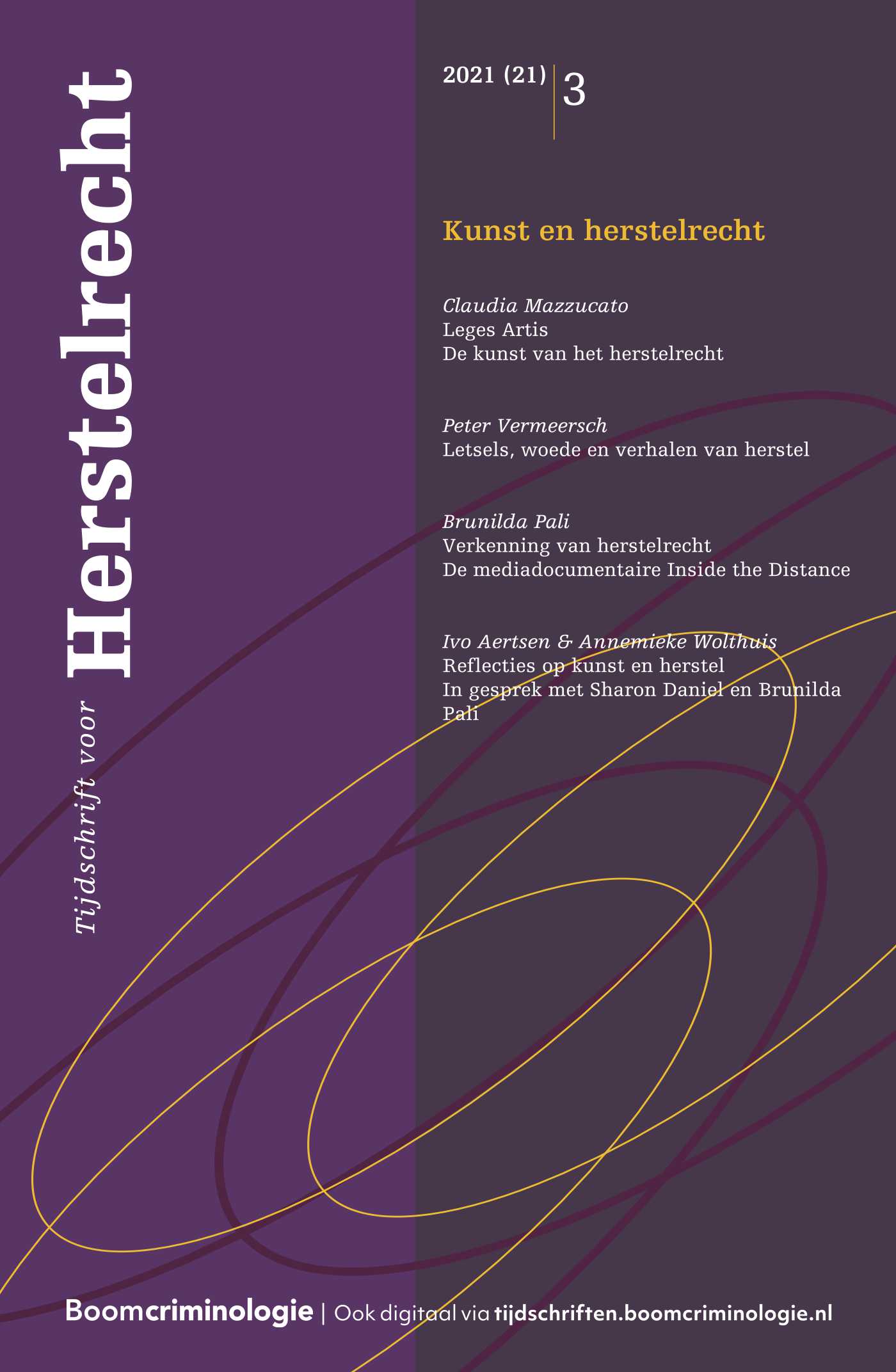|
In an editorial article the editors supply a commentary on the topics covered in the journal. |


Tijdschrift voor Herstelrecht
Meer op het gebied van Mediation en herstelrecht
Over dit tijdschriftMeld u zich hier aan voor de attendering op dit tijdschrift zodat u direct een mail ontvangt als er een nieuw digitaal nummer is verschenen en u de artikelen online kunt lezen.
| Column |
Het nut van recidivecijfers |
| Auteurs | Jo Hermanns |
| Auteursinformatie |
| Redactioneel |
Religie, rehabilitatie en herstel |
| Auteurs | John Blad |
| SamenvattingAuteursinformatie |
| Artikel |
Houdt religie af van misdaad?Over de impact van geloof, religieus geïnspireerde programma’s en rehabilitatie van daders |
| Trefwoorden | religie, criminaliteit, attituden ten aanzien van straf, herstel en vergeving |
| Auteurs | Bas van Stokkom |
| SamenvattingAuteursinformatie |
|
This study revolves around the broad question: can religion prevent crime? In the first part the (possible) impact of religious faith on social behaviour (or the prevention of certain behaviours) is discussed. Respectively the following aspects are dealt with: religion as a source of activism, religion as protective factor to keep people from crime, and the impact of crime on tolerant or intolerant and forgiving or punitive attitudes. The second part deals with deliberately organized faith-based-interventions, intended to support and help inmates. The role of identity change via redemption narratives is examined, as well as the question how professionals and volunteers may stimulate rehabilitation and reintegration of (ex-)prisoners. |
| Artikel |
Justitiepastoraat en ‘herstel’: een poging tot positiebepaling |
| Trefwoorden | justitiepastoraat, herstelrecht, schuldverwerking |
| Auteurs | Anne-Mie Jonckheere |
| SamenvattingAuteursinformatie |
|
There is a natural alliance between the ambitions of prison chaplaincy and those of restorative justice in the sense that in both approaches (coping with) responsibility and guilt by offenders are important issues and mechanisms at the same time. Both share a relational concept of crime, consider the evil deed as occasion to start a dialogue to examine responsibility, stress the importance of process and bi-lateral partiality with both the victim and the offender. Coping with guilt and making it productive requires that communication with the offender reaches the deeper and more intimate levels of giving meaning to the criminal offence committed, self, others, past and future. For this communication the context should be open and fundamentally loving in a Christian sense, leading the way to a liberation from guilt once it is thoroughly known and accepted. At that point guilt can be transformed into a constructive moral impetus in human relations. |
| Artikel |
Herstelrecht in de samenlevingBarmhartige gerechtigheid in de praktijk van de gevangenenzorg |
| Trefwoorden | herstelrecht, gevangenenzorg, barmhartige gerechtigheid |
| Auteurs | Hans Barendrecht, Martine Cammeraat en Esther Klaassen |
| SamenvattingAuteursinformatie |
|
The contribution informs about some of the activities and the philosophy of Gevangenenzorg Nederland, a non-governmental organisation for the care for prisoners, member of the Prison Fellowship International. Holding a person responsible for his or her criminal conduct does not only mean punishment, but also individualizing the person as a person, with his or her own life, history and future. The stay in prison should help the person to return into society as a citizen with an equal status, rehabilitated by his punishment. But social reality is far removed from this ideal. The volunteers of Gevangenenzorg Nederland try to bring closer a form or charitable justice, focussing not so much on the risks that a person may be perceived to pose, but much more on the healthy and socially positive talents of the detainee, against the background of the ‘good lives model’ of Ward and Maruna (2007). The article describes the workshop offered to detainees ‘Speaking of guilt, remorse, victims and society’, wherein participants can investigate and discover in a systematic way their own degree and type of guilt and responsibilities and the avenues that might be available to express remorse and to make amends with victims and society. Family members or other significant others are called in in the stage of concluding the course with presenting ‘restorative gestures’ of any personal kind. Care after leaving the prison is offered and planned, hoping to facilitate a fully rehabilitated reintegration into society. |
| Praktijk |
Puinruimen en herstel voor de toekomst |
| Auteurs | Henriette Pluimers |
| Auteursinformatie |
| Case |
Transitional JusticeGerechtigheid en vrede in overgangssituaties |
| Auteurs | Renée Kool |
| Auteursinformatie |
